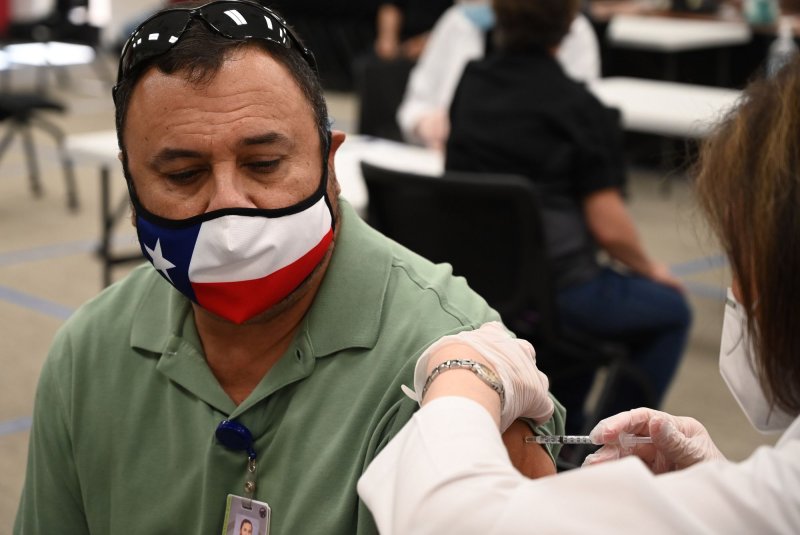1 of 5 | Teachers and school employees in Wylie, Texas, receive the COVID-19 vaccine in March. File Photo by Ian Halperin/UPI |
License Photo
June 7 (UPI) -- The two-dose COVID-19 vaccines from Pfizer-BioNTech and Moderna reduce the risk for infection by 91% in those fully vaccinated, according to data released Monday by the Centers for Disease Control and Prevention.
Moreover, fully vaccinated and even partially vaccinated people who become infected with the coronavirus are much less likely to get seriously ill, the data showed.
People are fully vaccinated 14 or more days after receiving the second dose of the two-shot vaccines and partially vaccinated 14 or more days after their first dose or one to 13 days after their second, according to the CDC.
"COVID-19 vaccines are a critical tool in overcoming this pandemic," CDC director Dr. Rochelle P. Walensky said in a statement.
"This study add[s] to accumulating evidence that [these] vaccines are effective and should prevent most infections -- [and] that fully vaccinated people who still get COVID-19 are likely to have milder, shorter illness and appear to be less likely to spread the virus to others," she said.
The new findings are based on four weeks of additional data collected during the agency's HEROES-RECOVER study of vaccine effectiveness in healthcare workers, first responders, front-line workers and other essential workers.
These groups are more likely to be exposed to the virus that causes COVID-19 because of their occupations, the agency said.
Preliminary results from this study first were announced in March.
In the latest findings, 3,975 participants completed weekly coronavirus testing for 17 consecutive weeks, from Dec. 13 to April 10, in eight U.S. locations, according to the CDC.
Participants self-collected nasal swabs that were laboratory tested for the virus.
If the tests came back positive, the specimens were further analyzed to determine the amount of detectable virus in the nose and the number of days that participants tested positive.
Participants were followed over time and the data were analyzed according to participant vaccination status, according to the agency.
Researchers took into account the number of COVID-19 cases in study participants' local areas, as well as how consistently participants used personal protective equipment at work and in the community.
Once fully vaccinated, participants' risk of infection was reduced by 91%, while it was lowered by 81% among those partially vaccinated, the data showed.
Study participants who became infected with the coronavirus following vaccination were combined into a single group and compared to unvaccinated, infected participants, the researchers said.
Those who became infected after being fully or partially vaccinated were more likely to have a milder and shorter illness compared to those who were unvaccinated.
Fully or partially vaccinated people who developed COVID-19 spent on average six fewer total days sick and two fewer days sick in bed.
They also had about a 60% lower risk of developing symptoms, like fever or chills, compared to those who were unvaccinated.
Fully or partially vaccinated study participants also had 40% less detectable virus in their nose and the virus was detected for six fewer days compared to those who were unvaccinated when infected, the data showed.
This means that fully or partially vaccinated people who got COVID-19 might be less likely to spread the virus to others, the CDC said.
"These benefits are another important reason to get vaccinated," Walensky said.
Currently, the CDC recommends that everyone age 12 and older get vaccinated against COVID-19.
Homeless and migrant laborers affected by the COVID-19 lockdown queue up to receive free cooked food distributed by Sikh volunteers in New Delhi, India, on May 18, 2021. Photo by Abhishek/UPI |
License Photo
















